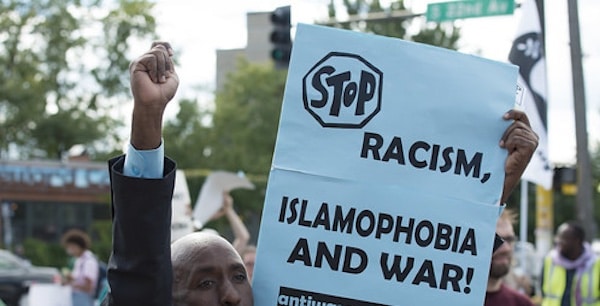Senator Richard Durbin
Chair, Committee on the Judiciary United States Senate
fax: (202) 228-0400
Senator Lindsay O. Graham
Ranking Member, Committee on the Judiciary United States Senate
fax: (202) 224-3808
Dear Senators Durbin and Graham:
We write on behalf of the Middle East Studies Association of North America (MESA) and its Committee on Academic Freedom to express our grave concern regarding the effort by Republican members of the Judiciary Committee to smear and delegitimize the Center for Security, Race and Rights at Rutgers University-Newark Law School, and especially its founder and executive director, Professor Sahar Aziz. This effort clearly threatens the First Amendment right of free speech and the academic freedom of both the Center and Professor Aziz. This effort is all the more disturbing for relying upon and invoking anti-Muslim and anti-Arab racist tropes.
MESA was founded in 1966 to promote scholarship and teaching on the Middle East and North Africa. The preeminent organization in the field, the Association publishes the prestigious International Journal of Middle East Studies and has nearly 2,800 members worldwide. MESA is committed to ensuring academic freedom and freedom of expression both within the region and in connection with the study of the region in North America and outside of North America.
The institutional target of the attack by the Republican members of the Judiciary Committee—the Center for Security, Race and Rights—is an academic institution engaged in research, public education and advocacy “to address the underlying structural and systemic causes of Islamophobia and xenophobia against people of Arab, African, and South Asian descent.” As the Center’s website notes, its work is driven by the increased discrimination and prejudice faced by Muslim, Arab and South Asian communities since the events of 11 September 2001. The Center’s founder and executive director, Professor Sahar Aziz, is Distinguished Professor of Law and Chancellor’s Social Justice Scholar at Rutgers Law School and is a renowned expert on the adverse impacts of national security laws and policies on racial, religious and ethnic minority groups. The Center’s mission has received praise from other academic organizations, including a 20 February 2024 statement by the faculty union at Rutgers, addressed to the Republican members of the Judiciary Committee, which “recognize[s] the importance of the Center’s wide-ranging work” and expresses pride in “the critical work of the Center. . . in advancing our core values and goals as a university.”
On 6 February 2024 the ten Republican members of the Senate Judiciary Committee sent a letter to the president of Rutgers University and the chairman of the university’s Board of Governors alleging that the Center had sponsored “events featuring anti-Semitic speakers, individuals who justify violence against the State of Israel, terrorist sympathizers, and advocates for domestic radicalism.” The letter directly attacked Professor Aziz, accusing her of “regularly and consistently promot[ing] vile antisemitic propaganda,” and demanded that the university respond to a series of highly prejudicial and tendentious questions.
We regard the letter as manifesting the very prejudices the Center and Professor Aziz have dedicated themselves to combatting. The allegations it sets forth are based on precisely the kind of “evidence” that those who traffic in anti-Muslim, Islamophobic and anti-Arab racism have long used to smear, delegitimize, and even criminally prosecute Arabs, Muslims, and South Asians. They reflect the prejudicial tendency to view Arabs, Muslims, and South Asians as congenitally predisposed to engage in terrorism; to deem criticism of U.S. foreign policy by members of these groups as support for terrorism; and to denounce members of these groups as antisemitic when they engage in pro-Palestine advocacy or criticism of Israel, regardless of the actual content of their statements or actions. In its statement the Rutgers faculty union noted that it is “troubling to see a group of elected officials use their powers to try to suppress free speech [and] undercut academic freedom.” “Your letter communicates your anger regarding certain viewpoints that you perceived to have been platformed at the Center,” the union’s statement told the senators, “and yet that anger should have no bearing on current or future activities of the Center.”
We note that there is good reason to believe that this attack on the Center and on Professor Aziz is part of a broader campaign by the Senate Committee’s Republican members to scuttle the nomination of Adeel Abdullah Mangi, the first Muslim nominated for a federal appellate judgeship. Many of the Republican members of the Judiciary Committee who signed the letter to Rutgers had attacked Mangi during his appearance before the Committee for, among other things,having served on the Center’s board of advisors. In our view, this renders the attack on the Center an even more flagrant abuse of the senators’ status and powers.
We therefore call on the Republican members of the Senate Judiciary Committee to immediately end their investigation of the Center for Security, Race and Rights, and to desist from threatening the free speech rights and academic freedom of Professor Aziz and all those associated with the Center. We further urge them to refrain from any future assaults on scholars and institutions of higher education, which can only undermine the ability of this country’s colleges and universities to fulfil their educational and intellectual missions.
We look forward to your response.
Sincerely,
Aslı Ü. Bâli
MESA President
Professor, Yale Law School
Laurie Brand
Chair, Committee on Academic Freedom
Professor Emerita, University of Southern California
Committee on Academic Freedom of the Middle East Studies Association seeks to foster the free exchange of knowledge as a human right and to inhibit infringements on that right by government restrictions on scholars. The United Nations’ Universal Declaration of Human Rights, Covenant on Civil and Political Rights and Covenant on Economic, Social and Cultural Rights provide the principal standards by which human rights violations are identified today. Those rights include the right to education and work, freedom of movement and residence, and freedom of association and assembly.

